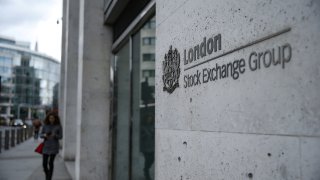
- The yield on the benchmark U.S. 10-year Treasury note rose again on Friday morning in the aftermath of the stimulus passage, hitting 1.6%.
- The U.K. economy shrank by 2.9% in January from the previous month, official figures showed Friday, a less severe contraction than expected as the country reentered nationwide lockdown.
LONDON — European markets retreated Friday as a rise in Treasury yields resurfaced some investor caution, but stocks in the region still logged their best week since November.
The pan-European Stoxx 600 fell 0.3%, with tech stocks shedding 2% to lead losses while banks added 1.2%. The benchmark saw gains of 3.5% for the whole week.
European shares received a reasonably strong handover from Asia-Pacific, where markets broadly advanced during Friday's trade. On Wall Street Friday, the S&P 500 lost 0.4%, falling from a record high reached in the previous session.
Feeling out of the loop? We'll catch you up on the Chicago news you need to know. Sign up for the weekly Chicago Catch-Up newsletter here.
That momentum on Thursday came after U.S. President Joe Biden signed into law a $1.9 trillion coronavirus relief package, which will send direct payments of up to $1,400 to most Americans. But sentiment turned on Friday as the yield on the benchmark U.S. 10-year Treasury note rose again, and was last seen at around 1.6% during afternoon trade in Europe.
The European Central Bank on Thursday vowed to ramp up its bond buying efforts "significantly" in the second quarter after borrowing costs rose across the continent, with European bond yields following U.S. Treasury yields higher over the past month.
Money Report
Investors were worried that rising bond yields could derail Europe's economic recovery, by increasing the borrowing costs for countries that are already struggling with the coronavirus crisis.
On the data front, the U.K. economy shrank by 2.9% in January from the previous month, official figures showed Friday, a less severe contraction than expected as the country reentered nationwide lockdown.
"While the national lockdown shuttered a range of industries, the hit to consumer industries was not quite as bad as it could have been," said James Smith, developed markets economist at ING.
"But what really stands out is health expenditure, where the ramping up of the government's test and trace scheme and vaccine programs added 0.9% to the GDP figures alone."
British luxury fashion brand Burberry saw its shares climb more than 6.8% to the top of the Stoxx 600, after upgrading its guidance on the back of a strong rebound in sales.
At the bottom of the index, Dutch tech investment firm Prosus fell 6.7% after China's market regulator fined Tencent, in which the company has a stake.
British property developer Berkeley Group fell 5.8% after projecting flatlining profits in 2021.
Credit Suisse dropped 2.5% as it faces questions from regulators over supply chain finance funds linked to the collapsed Greenhill Capital, according to Reuters.
- CNBC's Saheli Roy Choudhury contributed to this report.
Subscribe to CNBC PRO for exclusive insights and analysis, and live business day programming from around the world.






